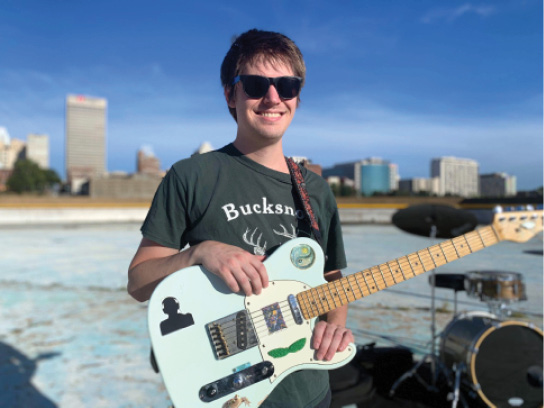David Collins, onetime jazz major at the University of Memphis, now the principal force behind avant-garde jazz group Frog Squad, is telling me about the players on his new album, Memphis, self-released on digital platforms last week. “It’s just a quintet,” he tells me. Sure, a quintet — featuring Collins, Paul Taylor on bass, and Haley Ivey on flute. If that sounds like alternative math, you’ll have to cut him a break: He’s a drummer. (Ba-dum bump).
Actually, Collins’ description is perfectly accurate. He’s speaking as an arranger, not a bean-counter, and the scores he wrote out for the album are indeed for five parts. Ironically enough, those don’t include drums. This album, aside from being rich with cascading harmonies and contrasting timbres, is one of those rare beasts, a work that’s completely free of percussion. And yet there are rhythms and counter-rhythms galore, as the acoustic and electric guitars and vibraphone (all played by Collins using overdubs) blend with the fretless bass and flute in an intriguing weave.
“When you don’t have a drummer, you hear the rhythm differently,” he tells me. “Actually, the acoustic guitar is kinda like the drums. I recorded that first. It sounds like it’s floating the whole time.” This is doubly so because of the flute’s prominence in the mix. The various instruments alternate between unison and contrasting lines of melody and harmony, creating a unique milieu that is such a world unto itself, it could almost be the score for a video game — a very calming video game — perfect for the onset of spring.
The world Collins evokes is Memphis itself, grounded in a very specific vision he has of the city. “This album is about things like weeds growing through the sidewalk. How Memphis is built on nature, but is in a constant battle with it as well.”
The titles tell the story: “Cooper-Young After it Rains,” “The Moon Over Shelby Forest,” “Petunia in the Sidewalk.” If there are battles here, they are expressed more as subtle tensions or abrupt turns to more aggressive passages, evoking folk rock like Pentangle, if that group had no vocals. Yet, unlike most rock, they are mere passing colors, moving quickly on to other tonal shades more common in jazz or classical music.
Though structured by the composer, there is also a suggestion of ambient music here, albeit a type devoid of synthesizers. Instead, more expansive spaces are suggested by processing the organic sounds. “That’s kind of the idea with nature growing through the sidewalk,” he says. “Like acoustic sounds being processed. I had a lot of fun running some of the flute, vibraphone, bass, and guitar parts back through pedals, or resampling them in Ableton. Then Patrick Moss, an electronic music producer, mixed it all. He did a great job. I gave him a bunch of resampled stuff and he had to figure out what to do with it.”
Fans of Frog Squad, who were steadily playing more shows in the years leading up to the pandemic, will be surprised. Though that group has both feet planted firmly in avant-garde jazz and may never play Beale Street, Collins says they are crowd-pleasers in their own way. “Frog Squad is like punk rock and psychedelic jazz. And it works well in grungy bar scenes, which you might not expect from a lot of jazz.” Though Collins does score horn parts for the group, this album takes his scoring to new levels.
His interest in melodic and harmonic instruments goes back to his family. “In sixth grade I picked up the drums. But my grandpa, Aubrey Morris, was a piano player who played with Eddie Bond and Reggie Young, back in the day. I grew up really close with my grandparents, and he was always playing. I’d play drums with him on piano, and he’d show me stuff on it. So I learned both at the same time, kind of.”
You can almost hear those family jam sessions echoed in the more propulsive vibraphone parts of Memphis. But ultimately, the greatest influences on the album were non-human. “I work Downtown, so I’m looking at the Mississippi River every day, and that thing is the biggest inspiration in my life. This huge, powerful force of nature, with gigantic bridges over it. It’s great.”
